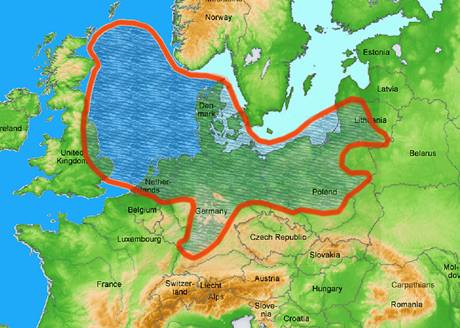Rain falling on impervious rocks, such as granite and slate, quickly run off forming streams or lakes. That falling on porous rocks of limestone or chalk is absorbed to dissolve soluble inclusions, and being acidic, react with carbonates to form solutes until stopped by an impervious layer below, and potentially form an aquafer.
Surface water is generally soft, low in minerals and alkalinity, while borehole water will be hard and high in alkalinity, although there are exceptions. One such is in some higher Pennines, that consist mainly of limestone, but can have intervening layers of millstone grit. The former is porous and soluble and the latter impervious and insoluble. Acidic rainwater (typically pH 6 with TDS of 10) dissolves the limestone above and at the edges, when overhanging grit collapses under its own weight. This can be plainly seen by the profile of Ingleborough and other fells.

An example of this exception is at Timothy Taylor's of Keithley, below which is the River Aire, 20 miles from emerging at the bottom of Malham Cove saturated in limestone minerals. Here, I assume, rainwater running off a millstone grit shelf, then through the thinned out limestone beneath and potentially repeated until trapped above grit below the brewery and still quite soft, is forced up the brewery's borehole. How their water is treated is better left to them in their video. https://www.timothytaylor.co.uk/brewing-process
We frequent read that British brewers boiled their hard water to reduce that and alkalinity for mashing, but above is where soft water is boiled (possibly to reduce the effect from sheep) and then hardened. We are told Guinness at its peak was made with soft water, but that soft water was used in their boilers and harder canal water was used for brewing liquor, as recorded in The Noted Breweries of Great Britain and Ireland.
All with hard supply water know any vessel used for boiling soon furs up and requires continuous acid treatment, which can be eliminated if the water is acid treated first. Hard water can be, by suitable treatment, advantageous to brewers of ales, but boiling to reduce alkalinity can be both difficult and expensive.
Hardness is the measurement of all calcium and magnesium in solution, but is usually expressed in terms of calcium carbonate per litre. If the individual units of calcium and magnesium per litre are known, then the equivalent value to express in terms of calcium carbonate is 2.5 times the calcium content plus 4.1 times the magnesium content.
To be continued.


